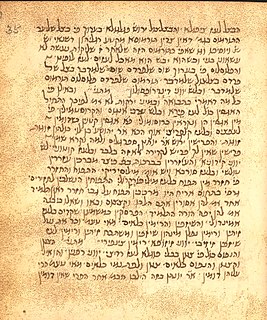
The Tosafot,Tosafos or Tosfot are medieval commentaries on the Talmud. They take the form of critical and explanatory glosses, printed, in almost all Talmud editions, on the outer margin and opposite Rashi's notes.

Yechiel Michel ha-Levi Epstein (24 January 1829 – 25 March 1908), often called "the Aruch haShulchan" after his magnum opus, Aruch HaShulchan, was a Rabbi and Posek in Lithuania.
Judah ben Samuel of Regensburg, also called Yehuda HeHasid or 'Judah the Pious' in Hebrew, was a leader of the Chassidei Ashkenaz, a movement of Jewish mysticism in Germany considered different from the 18th-century Hasidic movement founded by the Baal Shem Tov.

Meir of Rothenburg (c. 1215 – 2 May 1293) was a German Rabbi and poet, as well as a major contributing author of the tosafot on Rashi's commentary on the Talmud. He is also known as Meir ben Baruch, and by the Hebrew language acronym Maharam of Rothenburg. He was referred to by Rabbi Menachem Meiri as the "greatest Jewish leader of Zarfat " alive at the time.
Mordechai ben Hillel HaKohen, also known as The Mordechai, was a 13th-century German rabbi and posek. His chief legal commentary on the Talmud, referred to as The Mordechai, is one of the sources of the Shulchan Aruch. He was killed in the Rintfleisch massacres in 1298.
Rabbi Isaac ben Jacob or Yitzhak ben Yaakov, nicknamed "ha-Lavan" or "the white" was a 12th-century rabbi of Bohemia. He was a Tosafist and liturgical poet who flourished at Prague in the late 12th century.
Tamid is the ninth tractate in the Order of Kodashim, which is the fifth of the six orders of the Mishnah, Tosefta and the Talmud. The main subject of Tamid is the morning and evening burnt offerings, but it also deals with other Temple ceremonies. Its full name is "Olat Tamid". The tractate includes information about the Temple Service from sages who had been present at the Temple and witnessed the service. This tractate in the Talmud does not contain disagreements between the sages nor does it have exegetical derivations. It is written as a historical description of the service.
Isaac ben Samuel the Elder, also known as the Ri ha-Zaken, was a French tosafist and Biblical commentator. He flourished at Ramerupt and Dampierre, France in the twelfth century. He is the father of Elhanan ben Isaac of Dampierre.
Isaac ben Joseph of Corbeil was a 13th-century French rabbi and tosafist, best known as the author of Sefer Mitzvot Ḳatan.
Ephraim of Bonn (1132–1196), also known as Ephraim ben Jacob, was a rabbi and writer, known for documenting the massacre of the Jews in the city of York in 1190.
Kalonymos or Kalonymus is a prominent Jewish family who lived in Italy, mostly in Lucca and in Rome, which, after the settlement at Mainz and Speyer of several of its members, took during many generations a leading part in the development of Jewish learning in Germany. The family is according to many considered the foundation of Hachmei Provence and the Ashkenazi Hasidim.
Meir ben Samuel, also known by the Hebrew acronym RaM for Rabbi Meir, was a French rabbi and tosafist, who was born in about 1060 in Ramerupt, and died after 1135. His father was an eminent scholar. Meir received his education in the Talmudical schools of Lorraine, his principal teachers being Isaac ben Asher ha-Levi and Eleazar ben Isaac of Mainz, with whom he later carried on a correspondence.
Shemariah ben Mordecai was a German rabbi and tosafist of the first half of the 12th century, who was a pupil of the tosafist Isaac ben Asher. He was considered an especially eminent authority on religious rites, and seems to have written posḳim (decisions); no less a person than Jacob b. Meïr Tam consulted him on a difficult question.
Baruch ben Samuel, also called Baruch of Mainz to distinguish him from Baruch ben Isaac, was a Talmudist and prolific payyeṭan, who flourished in Mainz at the beginning of the thirteenth century.

Isaac ben Melchizedek, also known by the acronym Ribmaṣ, was a rabbinic scholar from Siponto in Italy, and one of the first medieval scholars to have composed a commentary on the Mishnah, although today only Seder Zera'im survives. Elements of the Mishnaic order of Taharot are also cited in his name by the Tosafists, but the complete work is no longer extant.
Rabbi Joel ben Isaac ha-Levi also known as Rav Joel of Bonn was a 12th-century German Tosafist, and the father of Eliezer ben Joel HaLevi.
Ephraim ben Isaac ben Abraham of Regensburg also sometimes called Ben Yakir, was a 12th-century German tosafist and liturgical poet who was known for his keen intellect, his numerous piyyutim and for controversy refusing to recognize any post-Talmudic authority.
Rabbi Isaac ben Eliezer Halevi also known as Rabbi Isaac Segan Lewiyah was an 11th-century French Talmudist, liturgical poet and Tosafist who flourished in Germany.



